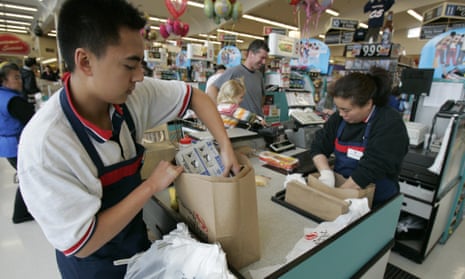There’s something about the act of sewing that is therapeutic for traumatized veterans, says Jim Cragg, a former US Army officer turned needlecraft entrepreneur. He should know: he’s the founder of Green Vets Los Angeles, a nonprofit sewing enterprise that makes T-shirts, medical kits, and reusable cloth shopping bags. Since 2009, the company has employed more than 100 former soldiers, some of them homeless and suffering from combat-related injuries.
“We have found that sewing is uplifting, like a form of therapy, and it makes vets feel like part of a team,” Cragg says. “To help people and to keep the environment clean gives them a sense of service. It brings value to their work.”
The future looks bright for Cragg’s sewing therapy: on Tuesday, California governor Jerry Brown signed a bill (pdf) enacting the nation’s first statewide ban on single-use plastic bags.
When it takes effect – in July for large retailers and in 2016 for small businesses – retailers will be barred from distributing lightweight, single-use plastic bags and will have to charge at least 10 cents each for paper bags. The ban covers the two-thirds of California’s population not already covered by 127 local ordinances.
More than 100 businesses, trade associations, labor and environmental organizations, municipalities and other groups supported the legislation. By comparison, fewer than a dozen groups – most prominently, plastic and paper bag manufacturers – opposed it.
New attitudes, new accouterments
“The new law is a game-changer for the state,” says Cragg, whose Green Vets was one of several reusable bag producers to officially support the measure. “It is as much about new employment and business opportunities and new fashion accouterments as it is about the environment.”
Green Vets, which is supported by a US Department of Veterans Affairs vocational rehabilitation program, is considering expanding its operations to veterans’ hospitals in Long Beach and San Fernando. Additionally, Cragg may expand his for-profit sewing company, Special Operations Technologies, to produce “nice, American-made reusable shopping bags”.
Another supporter of the law hoping to capitalize on rising demand for reusable bags is Chico Bags. The California-based manufacturer designs and sells reusable, foldable shopping bags that are made from 100% recycled materials – primarily a plastic bottle-based material supplied by Repreve. Its customers include retailers such as Whole Foods.
Andy Keller, Chico Bags’s founder, says the biggest impact of California’s ban is on consumer behavior. “It changes the question at the register from, ‘Paper or plastic?’ to ‘Do you need a bag?’” he explains.
Mark Dwight, the founder of San Francisco-based manufacturer Rickshaw Bags, also sees a cultural shift afoot. “People are wearing their virtues on their arms, instead of their sleeves,” he says. His company sells stylish canvas grocery totes with lifetime warranties to Whole Foods and other grocers.
Rickshaw also sells to corporations such as eBay, Google and Facebook, which print their logos on Rickshaw’s canvas shopping bags because “they want to be associated with quality, durability and usefulness,” Dwight says.
Big materials innovators are positioned to benefit as well. DuPont, for instance, is selling its “Tyvek” material – a paper, film and fabric blend – to reusable bag suppliers, including Burbank-based Earthwise Bag Company.
Plastic bag makers claim ‘false environmentalism’
The new law offers $2m in grants to in-state plastic bag producers – which employ approximately 1,800 Californians, according to an industry estimate – to retool their equipment to manufacture reusable bags.
But Phil Rozenski, the director of sustainability and marketing at plastic bag manufacturer Hilex Poly, declined to speculate on whether the industry would make use of the grants. He also did not comment on financial losses for plastic bag makers, which are poised to lose one of their largest markets.
A member of the American Progressive Bag Alliance, Hilex Poly opposed the ban. Rozenski claims the new law is not about plastic bags or the environment. Instead, it is about “false environmentalism” and “billions of dollars in profits going to retailers”, he said. Others have also questioned whether removing single-use plastic bags will make much of a difference overall.
Dave Heylen, vice president of communications at the California Grocers Association, adamantly rejects those views. “The opposition can throw out all kinds of numbers. There is nothing to support that,” he said. “This is an environmental issue and it’s about getting plastic bags out of the waste stream.”
Rather than seeking to profit from the new law, grocers are educating consumers on the importance of bringing their own reusable bags from home, he said. “The toughest part is changing consumer behavior, but it’s interesting to see it happening.,” he said. “Customers are embracing the concept of reusable bags.”
In other words, California’s plastic bag ban could bode well both for sewing – and shopping – therapy.
- Update: This article was updated to reflect the passage of the California plastic bag ban by governor Jerry Brown
Garrett Hering is a San Francisco-based journalist covering energy, technology, business and the environment. His articles have appeared in California Energy Markets, the Seattle Post-Intelligencer, the Frankfurter Allgemeine Zeitung and elsewhere.
The sustainable living hub is funded by Unilever. All content is editorially independent except for pieces labelled advertisement feature. Find out more here.

Comments (…)
Sign in or create your Guardian account to join the discussion